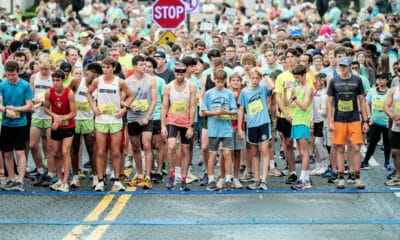Arts & Literature
Wesleyan Artist Market: Elizabeth Ables Talks about Art, Chemistry and Inspiration [Podcast]
Published
2 years agoon
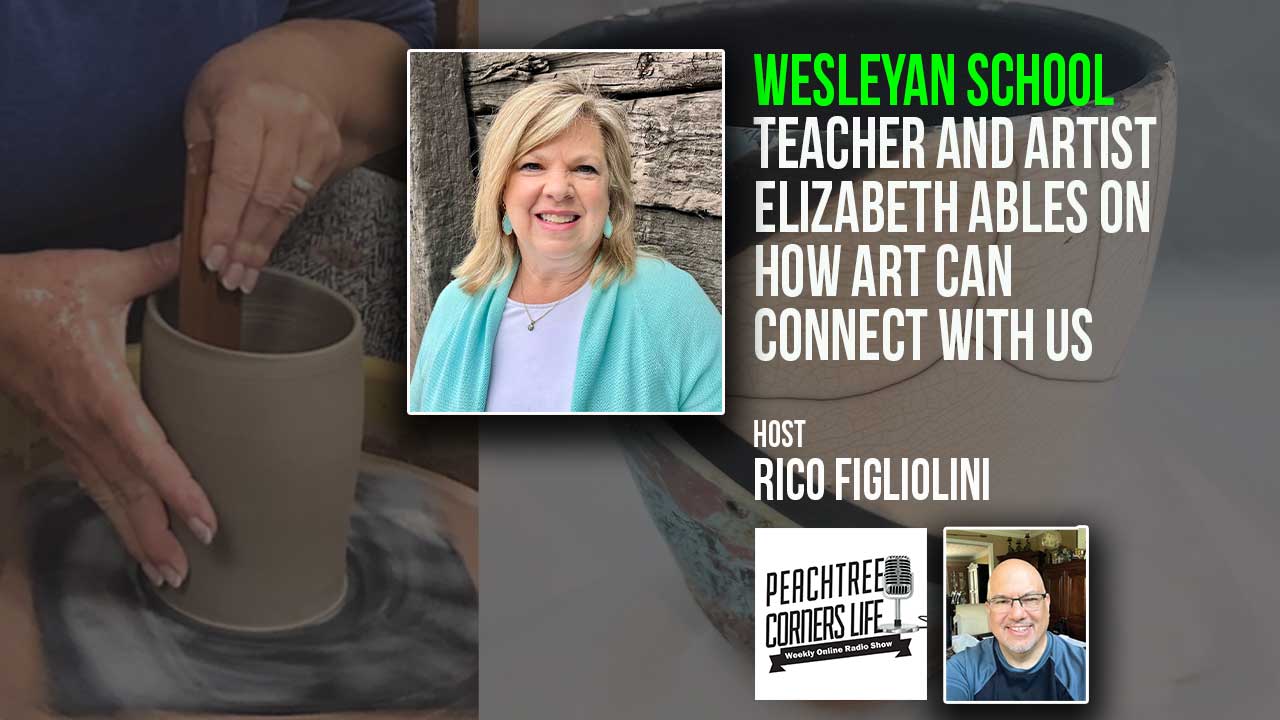
Elizabeth discusses the Market, her background and inspiration, and the impact that art has on our lives.
We’re talking with another artist to be featured at the Wesleyan Artist Market. Elizabeth Ables is an artist working primarily in pottery, but she is also a teacher to the young artists attending Wesleyan School. Rico and Elizabeth discuss the Market, Elizabeth’s history and inspiration, and the impact that art has on our lives.
Resources:
Elizabeth’s Instagram: @Ables.Elizabeth
Wesleyan Artist Market: https://www.artistmarket.wesleyanschool.org/?fbclid=IwAR1CHO4OSbMxutNgMGk3X9B2YXFsOJiXVhjXvhu7jQ3fbqenUlW-bemPSSc
“There’s always a risk that a piece is going to crack and that you’re not going to get the color that you want to. But then with experience, you realize it’s just clay. I can make it again. And I can try again. And sometimes you get happy accidents, where it might not have been what you were planning for, but what you ended up with was beautiful in its own right… It’s just like life in that sense. But if you’re open to what you get, often it’s so much more beautiful.”
Elizabeth Ables
Timestamp:
[00:00:30] – Intro
[00:01:58] – Being an Artist and a Teacher
[00:03:50] – Raku Pottery and Technique
[00:07:49] – Elizabeth’s History and Inspiration
[00:11:18] – Teaching Young Artists
[00:18:18] – Wesleyan Artist Market
[00:22:11] – Fun Facts about Elizabeth
[00:25:04] – Closing
Podcast Transcript
[00:00:30] Rico: Hi everyone, this is Rico Figliolini, host of Peachtree Corners Life. The podcast that covers everything about Peachtree Corners, here in the great state of Georgia. Today, we have a special guest because it’s artist month, right? Wesleyan Artist Market will be held at the end of this month and so we have one of the featured artists here today to talk to us about her art and about Wesleyan Artist Market. But before we get to that, I wanted to thank one of our supporters, EV Remodeling. Content is supported here by community-minded companies and organizations like EV Remodeling that help us produce editorially independent content. They are companies that underwrite us in additional ways beyond print advertising. And Eli, from EV Remodeling has come on board as a great sponsor of ours. Not only for the magazine, our new launch of a new magazine coming out in May called Southwest Gwinnett Magazine, but as well as these family of podcasts. So I want to thank them for their support. To find out a little bit more about their work and the philosophy of designing your space to design your life, check out Eli’s website at EVRemodelingInc.com. So thank you Eli, I appreciate your support. I want to bring on our artist. Hey, Elizabeth, how are you?
[00:01:44] Elizabeth: I’m good, thank you. How are you this morning?
[00:01:46] Rico: Good, good. You’re one of three artists that we’re profiling in the latest issue of Peachtree Corners Magazine. That should be hitting the mailboxes this weekend.
[00:01:57] Elizabeth: I got mine yesterday.
[00:01:58] Rico: Did you really? Good. The Post Office is working overtime then. That’s good. That’s great. So, and that was written by Patrizia Winsper who’s done some great work. And she’s done, I guess the articles of profiles of artists for the last three years running for us. And I do appreciate you being on our podcast. I think we had, there were two students that we had from Wesleyan Artist Market just a few weeks ago on our podcast to talk about their work. So it’s good to have, not only are you an artist, but you work for Wesleyan School as well, right?
[00:02:28] Elizabeth: I do. I’m the elementary art teacher. And so some of the students that are now participating as artists were some of my students when they were much younger. And it’s so amazing to be able to watch their talents grow and to see their inspiration and to see kind of the, just the direction that they take. And some of them may choose to continue on with design and with art. But they’re all just so incredibly talented that it’s, that’s one of the cool things about this art show is that you do get to see some emerging artists as well. And the community gets to celebrate the arts here in the springtime and see such a variety.
[00:03:04] Rico: Yeah. Interestingly enough, I mean, some people think art is just paintings, drawings, and maybe pottery. But there’s a whole world out there of stuff. I mean, one of the kids does seamstress work and creates through fabric, creates her art.
[00:03:18] Elizabeth: Yes. And you think about our world nowadays with social media, there is so much visual communication. And we are all drawn to things that are attractive or have something that connect with us. Well, that’s an artist who designed it.
[00:03:33] Rico: Yeah. From their perspective and what they see, the experience of creating the art. You know, I think one of the things Patrizia quoted you about is that art, if you want perfect you buy the manufactured pieces. There are a thousand molds just pieces, right?
[00:03:49] Elizabeth: Exactly.
[00:03:50] Rico: Because it was interesting to just, to read that article about the way you work. And the way pottery, the way glass, the way artwork, when you’re firing up artwork even, how number one, it could be explosive in so many different ways, right?
[00:04:05] Elizabeth: Yes, exactly. And very unpredictable.
[00:04:09] Rico: Yes. Unpredictable. Where you might start out with what you think is a blue and chemistry will and fire will show you that no, it’s a red.
[00:04:18] Elizabeth: Yes. And within the pottery world, specifically what I was talking about there, I was talking about Raku. Which Raku is very environmental that’s where it’s more unpredictable. In an electric or a gas kiln, which is the firing process, it is more predictable. And the chemicals that go into the glazes, you know the range that you could get. So speaking of this particular range in the Raku firing, I know if I don’t put it in reduction, which is putting in one of those containers where there are combustible materials and you put a lid on it. So the fire sucks out, uses up the oxygen, sucks out certain particles, certain minerals in the glazes. You kind of know the range that you’re going to get, but it is still unpredictable. And where that range is going to hit. Like, where is there a hotspot in the fire? And that sort of thing. And so whether your item is in the top of the kiln or on the bottom of the kiln. How fast it cools, how fast you put it in reduction, if you’re doing Raku, all of that impacts the coloration and where it’s going to be. So you can know a range is basically what you’re going to get, but you it’s unpredictable.
[00:05:26] Rico: Amazing. It’s so you’re, when people see movies where people are making pottery and stuff, and then they have to have to kiln it, they have to like bake it if you will. Yeah.
[00:05:39] Elizabeth: Exactly. And so one of the things, you know, that movie everybody thinks of, gosh, there was that one movie with Demi Moore and Patrick Swayze, and it really is very kind of sensual and informing it and very meditative, very cathartic. And so that part was so true. Ghost, that was the movie. That part is so true. And it just, the feeling of it, you just really can get lost in what you’re doing.
[00:06:04] Rico: You do your work at, I think, if I understand correctly Spruill Art Center.
[00:06:08] Elizabeth: I do. Mostly because, in my classroom here at school, I don’t have a wheel. It takes more strength. And so that’s going to be in the upper levels. And so I do hand building with my students. And that’s where they basically, they make pancakes and turn it into something. They form a, what’s called a pinch pot, which is a centuries old process of starting with a ball and then forming it with your thumbs and your hands to form a pot. Then you can do coils. That’s the way we work here and that’s learning the fundamentals of clay. And that’s what I started with when I was learning clay as well, was learning the fundamentals of hand building. And then I went into the wheel or throwing pottery. And that takes a lot of strength and it, the key to that is really being able to center your clay. So trying to get it completely in the middle and get it smooth. And that takes a lot of practice and skill and strength.
[00:07:03] Rico: I would imagine if you didn’t have a good day, going to do that may not turn out well, or it could turn out well, I guess.
[00:07:09] Elizabeth: Exactly. Some days you get to the wheel and you’re just like, wow. Things are just not quite working today. And then other days you do something and you’re forming it and in 15 minutes you get a beautiful pot and you’re like, wow. I’ve got the feel today, so.
[00:07:23] Rico: I think anyone with a passion, whether it’s sports or it’s art, when they’re at that plate or they’re on that field or they’re at that seat, creating something. If it’s not your day, it’s not your day, right? To be able to create what you need.
[00:07:38] Elizabeth: Yeah, we really do. We have days where somehow it’s all clicking, you’re focused, you’re in a feel, and you keep going. And then other days you decide it’s time to clean your bucket and go with something else.
[00:07:49] Rico: You’ve had experience in different art work out through the years. I understand that you moved here to Peachtree Corners maybe about 28 years ago?
[00:07:56] Elizabeth: Yes, I did. I’ve been in Atlanta since ’87.. And so, but I was in the Dunwoody area as opposed to up here in Peachtree Corners. And I did many different art forms through the years. One thing I did a lot of heirloom sewing, hand embroidery, hand dying, antique laces and things like that. And I’ve done some painting.
[00:08:16] Rico: Okay. But you’re settling on the work you’re doing now. And what is it? I would say pottery, but what, how would you describe it? Like, the work?
[00:08:26] Elizabeth: Yeah, pottery. I love, I love finding beauty in functional items. I’m not as much a sculptor for a, so I’m not looking for abstract. Even though some of the Raku pieces are more decorative than they are functional, due to their surface nature. But I just love having beautiful functional things around. And that’s kind of what got me started, is wanting to be able to make those things that I could envision in my head. You know, little bowls on the counter that you want to put your recycling in or something, just that simple kind of stuff. But I wanted something really pretty and I wanted it sort of organic. I didn’t want it commercial. I wanted to kind of come up with the vision, the size, the color, the texture, all of that, that I wanted on my own.
[00:09:07] Rico: So is it fair to say you get your inspiration from everyday life or the?
[00:09:12] Elizabeth: I do. I really get most of my inspiration probably from nature. I’m very much an outdoor kind of person and just love the beautiful colors that we find in nature, birds. The ocean is a big inspiration, and that’s one of the things that I’m constantly trying to replicate in my glazes, is kind of just coming up with those colors of the ocean and the blended colors. So not really a solid, but blended. And textures from nature like bark. Yeah.
[00:09:38] Rico: So that must be difficult because talking about the color before, and how chemistry is a big part of this, and fire, and heat, and being able to stop the reaction. Does it get easier with experience or is it still hit or miss to where you feel?
[00:09:53] Elizabeth: It gets easier with experience, but there is some hit or miss to it. You’ve just got to know that there’s a certain amount of unexpected and there’s always the risk. There’s always a risk that a piece is going to crack and that you’re not going to get the color that you want to. But then with experience, you realize it’s just clay. I can make it again. And I can try again. And sometimes you get happy accidents, where it might not have been what you were planning for, but what you ended up with was beautiful in its own right.
[00:10:24] Rico: A delightful surprise.
[00:10:26] Elizabeth: Exactly. It’s just like life in that sense. And that you you’ve got these plans, but it doesn’t always work out that way. But if you’re open to what you get, often it’s so much more beautiful.
[00:10:39] Rico: So do you find yourself sometimes driving or doing things and then all of a sudden think things, like darn, well next time I think I’m going to try to put horse hair on the layering of the pot to see if that burns off and becomes. Do you think like that? Is that something you do in the middle of?
[00:10:55] Elizabeth: Yes, but I certainly cannot claim to have inspired and created that process of the horse hair. Like that goes back hundreds of years, I believe in Japan. So, no, I don’t claim that. But I would love to say, you know what, I’d love to do this and see what would happen if I do this. And maybe if I put just a little, or if I put a lot or if I do this kind of a shape, how is it going to change?
[00:11:18] Rico: Now you have young kids you’re teaching and they’re going through the process.
[00:11:22] Elizabeth: Yeah. My children, my students are young kids. My children are in their late twenties.
[00:11:26] Rico: That’s what I meant your students at Wesleyan. And I grant that they’re doing the basic work. But do you find that some of the students that come back to you have done more? Have done other things?
[00:11:38] Elizabeth: Oh, absolutely. Absolutely. Where they get to go on and they learn more and they experiment more, they develop more skills and develop their confidence to be able to go in the direction that they envision. You know, it takes a lot of confidence for children to risk failure to be able to create art. Cause you’ve got to fail a lot of times as we all know. And so, to be able to see them when they get up potentially to their AP art and they do it in AP 3D Art. I mean, there was just a special student a couple of years ago and he’s at Kennesaw and he was just making some glorious things and just getting so intuitive with his forms. And then how he was altering those forms to represent an idea that he had was just so heartwarming and that, it’s just exciting to see.
[00:12:29] Rico: So as a teacher, do you find some of them coming back or sharing things with you?
[00:12:33] Elizabeth: Oh, absolutely. I follow some on Instagram and to see what they’re doing. I’ve got a little student now that was always enamored with birds and she’s going to be a participating artist in the show and she has got some beautiful pieces showing birds. And now she’s doing them, not in a traditional sense, but she’s got her own view on how she’s presenting them. And that’s what an artist does, is sees things differently and helps other people see things in a different way through their art.
[00:13:02] Rico: Right. So, and the kids that you teach now, how old are they? What age?
[00:13:06] Elizabeth: Kindergarten through fourth grade.
[00:13:07] Rico: That’s definitely a certain perspective different from high schoolers and middle schoolers, I’m sure.
[00:13:13] Elizabeth: Yeah. You know, in some of the ways they’re more free. They just, they have no problem painting horses blue and doing all sorts of things, you know? But then as they do get a little bit more fourth grade, that’s when the inhibitions and the insecurities of comparison to fellow students comes in. So that’s when they start to withdraw a little bit. But my goal as the teacher is hopefully to give them skills and confidence and courage to be able to work through that, to be able to get past that fear of failure and realize, it’s just paper, it’s just ink, it’s just pottery and clay. And that’s how you know, I’m going to learn.
[00:13:49] Rico: You know what I think also as they get older, I mean, I’ve been speaking to my daughter lately, she’s a psych master. So we sit down and we talk for an hour sometimes about stuff. And we talked about how, when you’re younger, you see things much differently than an older person. Because an older person has so many years of experience and also years of a perspective, right. Which is a lot different than younger people. They, younger people see things very differently, I think. Because they’re on that other end of life, right? And so sometimes, so I have a young son that also writes, and sometimes they don’t want to share this stuff. Because, you know, it’s just like, well, what are you going to think about it? Or what are you going to think about me reading this, you know?
[00:14:32] Elizabeth: Yeah, you’re opening yourself up to being vulnerable to people. And that opens yourself up for judgment. It opens yourself up for failure and it brings out the insecurities that we all inherently have.
[00:14:44] Rico: Yeah, because art is personal, right? I mean, you do something and I’m sure you pour your heart into something and then you want to show it. And then as an artist, you might be listening, stepping back and listening to different people looking at it. And maybe they’re not knowing you’re around, and they will have different perspectives. And I’m sure, have you, have you heard anything that you could share that would be one of those surprising moments where someone said something about your artwork?
[00:15:10] Elizabeth: Oh, my goodness. Well, I will say this, my students are just some of my best cheerleaders. When they come to the Artist Market and they see my work, they’re just like, oh, Ms. Ables you’re just so good. And you know, and that’s just so heartwarming because in my mind, when I look at some of the pieces, I might see the imperfections that I wish weren’t there. And so, they’re wonderful. So if you ever are having a bad day, just pull the young students out and they’re going to remind you that you’re kind of a rock star in a way. They’re also going to tell you the truth sometimes that you don’t necessarily want to hear, but they’re, they’re wonderful. And that’s just one of the blessings of what I do. I can’t think of a time when I was like eavesdropping or rather able to hear that.
[00:15:55] Rico: That’s fine. Sometimes that happens. When you were young and you went to school, what did you study in college, for example? Was it art, I mean?
[00:16:03] Elizabeth: No, it was not art. It was actually communication and sociology. So I was planning on going into broadcasting. So I worked on a television show in the news program some and then I just ended up, I guess I chickened out. And I wasn’t willing to go off and move to a really small market, really small town, and kind of be on my own quite at that point. So you know, life has a way of bringing things differently. And so through my children, I ended up getting my teaching degree and that’s what brought me kind of back full circle. And that’s why I said, even in the article that I think of myself more as a creator, because I’m not a formally trained artist. Which many of the greatest artists around and throughout history were not formally taught. So there’s a lot to be said for the experience of trial and error. You know, I’ve had some great teachers and inspirational people along the way.
[00:16:55] Rico: I guess if you know, if we talk about like centuries ago, like the Renaissance. I mean, there were workshops, people became apprentices to famous artists and they would learn that way. I mean different now. You go to school, they teach you, you know, you go through these classes and levels and they teach you different materials, different mediums that you use.
[00:17:16] Elizabeth: So they can teach, your education can teach you the technical aspect and it can teach you I guess, skills and things like that. But it doesn’t teach the heart and the passion for what it takes to really be able to communicate through your art, something that’s unique to you.
[00:17:33] Rico: Yeah. Film school is like that. I think you could go and you learn the technical aspects of how to shoot something. Then you at least can know what rules to break, right? And if you have that passion and you have a great reel, then you’re going to be able to make it somewhere maybe. But sometimes it’s luck too, right? It’s the, where you put yourself out and how much you put yourself out. You know, to get that praise or that judgemental. You know, I mean, people are going to judge your art one way or another.
[00:18:02] Elizabeth: It does help to have a little bit of success early on, and a little bit of that because it does, it just emboldens you to keep going in that direction and to keep trying. And if the door slammed a few too many times, you really have to dig deep to find that resilience to keep going.
[00:18:18] Rico: That’s right. That’s right, I’m sure. So how long have you been doing the Wesleyan Artist Market?
[00:18:24] Elizabeth: Well, as a participating artist, I think about six years. Actually when I came to Wesleyan School, 24 years ago I guess, when my son first started at Wesleyan school. I was familiar with an art show in another city. And I brought kind of my vision of trying to create an art show for Wesleyan. So I actually started the art show. So for the first five years, I was the chair of the art show. And then I took a hiatus and then I came back as working here and then I became a participating artist. So I went from being a customer, the founder, customer still, right? And now I’m a participant artist.
[00:19:05] Rico: Wow, okay. I didn’t know that about you. That’s good to know. So but now do you do any exhibition work or showings outside the Artist Market?
[00:19:15] Elizabeth: I don’t. And the main reason why is I’m not a high production potter because this is not my full-time job. And so I just don’t have enough time to create the inventory that I need to go do some of the other area art shows. So I find Wesleyan and the Wesleyan Art community, they get my first shot. They get my attention.
[00:19:36] Rico: Do you have an Instagram account or use that scene for your stuff?
[00:19:40] Elizabeth: You know what, I am developing my Facebook account, so I’m going to have Facebook Marketplace.
[00:19:46] Rico: Oh, okay.
[00:19:46] Elizabeth: And then eventually I will get to Etsy. It’s been on the to-do list, but again, keeping up with the production of it is just the challenging part.
[00:19:54] Rico: Yeah, for sure. Etsy and social media has made it great for artists to be able to share their artwork, be able to find followers that are interested in the pieces that the artists produce. So it’s a great time for our young artists, I think.
[00:20:09] Elizabeth: Yes, it is, really. Especially during this pandemic, it’s been able to keep the arts going and keep people connected.
[00:20:16] Rico: For sure. And technology is just making it easier to be able to, even be able to see things in a three-dimensional way versus just a flat piece of art. Like image on the screen. It’s becoming less expensive to create your artwork in a way that people can flip it and look at it at their leisure versus let’s say a video. So just a lot, lot of good technology out there making it better for artists to be able to share their work. So it’s kind of cool that way. Okay, because you do what you do when you go shopping and you, you know, you’re going out at other, we’re not talking about flea markets or art festivals and stuff, but just normal shopping. Do you see stuff that inspires you? Do you see things there that says to you, why is this even being sold?
[00:20:58] Elizabeth: Sometimes I see the things that are, why is this thing even being sold? Yes. But again, I do definitely see some things. I love italian pottery and I love that earthiness and that look of that. And I see things, and I keep thinking, I want to be able to achieve that color in my pieces sometimes. Cause I’m so drawn to color. And there are certain colors that are really difficult to get in the glazes. Just, and so I keep looking for the perfect color and keep looking, as I create my art and try and develop more and more patience with trying to take the time to create and to fine tune, particularly the glazing process. And so I do.
[00:21:38] Rico: Do you do sample glazes? That was just hitting me as you were saying, and we talked about chemistry before. When you’re creating the chemistry for these glazes, if you will, do you test fire some samples?
[00:21:49] Elizabeth: Yes, you really should. Mainly because to get the layering and to see how they’re going to react with each other. And so that is important. So you make little tiles that you are able to do that. Knowing that it’s going to be a little bit different, but you try and create these little ridged tiles that are going to give you the vertical effect. So you know, if it’s going to run or is it going to break and things like that.
[00:22:11] Rico: Alright, cool. I just want to ask you some other questions to tie things up a little bit that I normally ask my interviewees, I did this with the students. Just some quick questions, like what’s your favorite, or most inspirational place in Peachtree Corners? Or in general.
[00:22:27] Elizabeth: In Peachtree Corners, my favorite inspirational place, I would kind of say my backyard. I’ve got beautiful trees and I’ve got beautiful azaleas and the birds. I do love taking walks and we’re blessed here to have so many parks, which is wonderful. But in my neighborhood we have a park down along the river and that’s just always so inspiring. I can almost feel the people that walked on those grounds 200 years ago, along the river, and yeah.
[00:22:54] Rico: For sure. What is your favorite book or movie?
[00:22:58] Elizabeth: Gosh, I will say modern day book would probably, where the Crawdads Sing was a good one. Redeeming Love is a pretty amazing one. And then kind of more of a classic, To Kill a Mockingbird. To go back and read that as an adult, and there’s also the audio version, which Sissy Spacek narrated, which really brings a flavor to it, which is pretty cool. So I like that one.
[00:23:23] Rico: Yeah, the kids have read that. Obviously it’s a classic book for reading in English class and seen the movie.
[00:23:29] Elizabeth: But to come back and read it years later and to really get the nuances, that’s pretty.
[00:23:33] Rico: Yeah. Especially the original version versus, I think there’s several versions of it, but as far as edited versions. Removing words and stuff. The original version really does make a difference to read it in that language.
[00:23:47] Elizabeth: It does. And to think about it in the current, the light of what’s happening in current day.
[00:23:52] Rico: Yeah, for sure . What wouldn’t you do without?
[00:23:56] Elizabeth: I would not do without, of course family doesn’t count, but family. And my animals, right? My animals. I wouldn’t do without creating of some sort.
[00:24:06] Rico: Okay. I think you said before, you’re a cat person?
[00:24:09] Elizabeth: And dogs. I’m just an animal person. Yeah. I’d have a menagerie, if I could.
[00:24:15] Rico: What’s your favorite food?
[00:24:17] Elizabeth: My favorite food. Gosh, I don’t guess french fries is a good option. No, not allowed to say that.
[00:24:26] Rico: Extra fries please.
[00:24:28] Elizabeth: Yeah, really. Vegetables.
[00:24:31] Rico: Oh, okay. Cool.
[00:24:33] Elizabeth: I love vegetables.
[00:24:34] Rico: Alright. And last question is, if you had a superpower, what would that be?
[00:24:38] Elizabeth: Gosh, I thought about that one other time, and now I’m on the spot, you know, trying to figure it out.
[00:24:42] Rico: It’s hard. You have Superman, you have Spider-Man you have.
[00:24:46] Elizabeth: And I’m thinking too, the first thing that came to my mind was to be able to create, to bring peace, but that’s not the same kind of super power that we’re thinking. I wouldn’t want to read minds, I know that part I would not want to read minds. So, maybe to stretch and morph into any shape you want.
[00:25:04] Rico: There you go. That’s very artistic actually, when you think about it. Alright, we’ve been talking to Elizabeth Ables, teacher and a student in a way of life, an Artist that’s going to be at the Wesleyan Artist Market. So tell us where we can find out more about the Artist Market. Where can we find you there if we come visit? And all that or how can people follow you if that’s the case?
[00:25:30] Elizabeth: So for following me, I am on Facebook marketplace and then I am on Instagram. Just, I think Elizabeth Ables. Now the Wesleyan Artist Market is on the campus, the beautiful campus here in Peachtree Corners. And it’s going to be open on Friday, April 29th from ten to seven, and then on Saturday from ten to three, I believe. And there’ll be about 70 plus professional artists, as well as student artists. There’ll be food trucks. It’ll be a wonderful celebration of the arts. And there’s a variety of art styles, mediums, price ranges, you name it. And the artists have got to be present. And it’s not reproductions, it’s gotta be original art. And so it’s a wonderful opportunity to meet the artist, to learn more about their process and what their inspiration was, and to really be able to connect in a personal way with what you want to bring into your home. And I think that’s what makes the show special. Because you can go to a gallery, but this way you get to see the artist and speak to them. Bringing art into your home is a personal thing. It’s going to be a part of your life for a long time. And so to know the reason why the artist created it helps you to connect, and it becomes part of your family. It’s just part of your visual family.
[00:26:43] Rico: Yeah, for sure. You need that background. You need that understanding of how that art came to be. It is Friday, April 29th from 10:00 AM to 7:00 PM there’s some special events that day also Handcrafted coffees and gourmet baked goods for sale all day long even. So feel free, right? There’s pizza on the quad at 3:00 PM.
[00:27:03] Elizabeth: It’s free parking. It’s in the big gymnasium that’s in the center of the campus. So you can get to it from many different directions. There’ll be a lot of signs. There’ll be a lot of people directing you there. And you know, it’s just a great celebration. We’re praying for good weather because that’s always important.
[00:27:20] Rico: So to find out, just Google Wesleyan Artist Market or go to LivingInPeachtreeCorners.com or search them on Instagram because you can follow them there as well. Thank you, Elizabeth. I appreciate you taking your time with us and sharing a little bit about what makes art for you.
[00:27:36] Elizabeth: Well, thank you very much for spotlighting the Artist Market and for including me and giving me the opportunity to kind of talk about why I do what I do, and why I love what I’m doing, and bringing art to Peachtree Corners.
[00:27:49] Rico: This was fun. Thanks, Elizabeth.
[00:27:51] Elizabeth: I appreciate it.
Related
Around Atlanta
City Springs Theatre Company Presents the Hit Musical Jersey Boys
Published
3 weeks agoon
July 3, 2024
The megahit musical Jersey Boys makes its regional premiere in City Springs Theatre Company’s (CSTC) first-ever, five-week run at the Byers Theatre in Sandy Springs.
Directed by Atlanta’s-own Shane DeLancey, and choreographed by Meg Gillentine, Jersey Boys tells the rags-to-riches story of Frankie Valli and The Four Seasons. The show details their remarkable journey from the streets to the top of the charts, to their 1990 induction into the Rock and Roll Hall of Fame.
Leading the cast of Jersey Boys is Haden Rider as Frankie Valli. Rider is a City Springs Theatre Company veteran, with recent roles in both Legally Blonde (Emmett) and Fiddler on the Roof (Perchik).
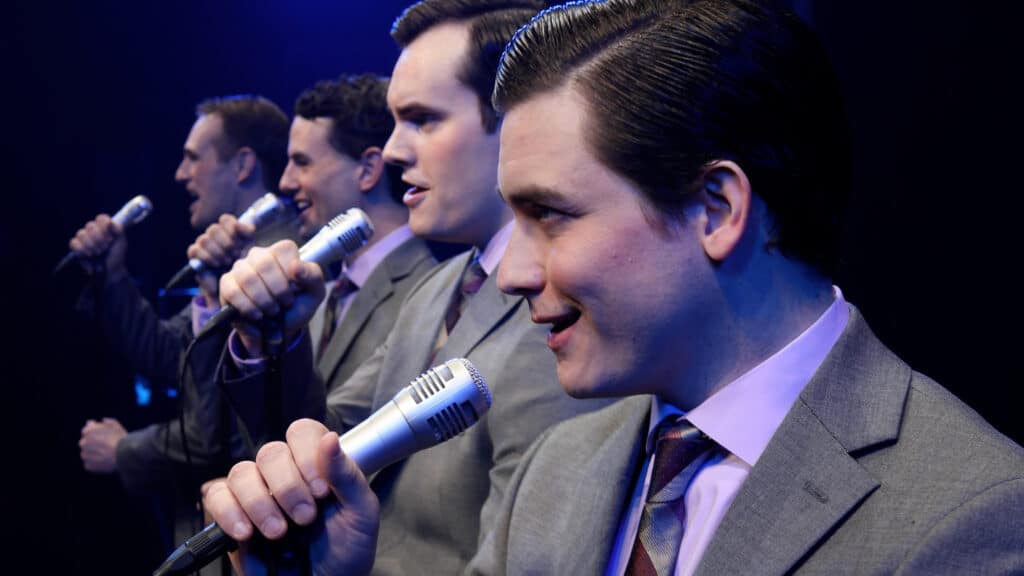
Presented by Resurgens Spine Center, Jersey Boys runs from July 12 through August 11, and shines a special spotlight on home-grown talent, as the show’s four leading men are all Atlanta-area residents.
With phenomenal music, memorable characters and great storytelling, Jersey Boys follows the fascinating evolution of four blue-collar kids who became one of the greatest successes in pop-music history.
“City Springs Theatre Company is very proud to be the first in the southeast region to present Jersey Boys,” said CSTC Artistic Director and Tony Award-winner Shuler Hensley. “Our audiences have been asking for this particular show since we opened. The production is truly stacked with talent onstage and off, and we’re pulling out all the stops to bring audiences an experience that will rival any previous version of the show.”
Jersey Boys premiered at the La Jolla Playhouse in 2005, prior to its 13-year Broadway run, from 2005 to 2017. There have been productions of the show in Las Vegas, UK/Ireland, Toronto, Melbourne, Singapore, South Africa, the Netherlands, Japan, Dubai and China.
Jersey Boys features a book by Marshall Brickman and Rick Elice, with music by Bob Gaudio, and lyrics by Bob Crewe.
Individual tickets to see Jersey Boys are on sale now ($42 – $108), with discounts for seniors, students, groups and active and retired military personnel.
CSTC’s Box Office is open Monday through Friday from 10:00 a.m. – 5:00 p.m.
Call 404-477-4365 or visit CitySpringsTheatre.com for more information.
This production contains adult language and is recommended for mature audiences.
Performance schedule:
Friday, July 12 | 8:00 p.m.
Saturday, July 13 | 2:00 p.m. & 8:00 p.m.
Sunday, July 14 | 2:00 p.m. & 7:30 p.m.
Tuesday, July 16 | 7:30 p.m.
Wednesday, July 17 | 7:30 p.m.
Thursday, July 18 | 8:00 p.m.
Friday, July 19 | 8:00 p.m.
Saturday, July 20 | 2:00 p.m. & 8:00 p.m.
Sunday, July 21 | 2:00 p.m. & 7:30 p.m.
Tuesday, July 23 | 7:30 p.m.
Wednesday, July 24 | 7:30 p.m.
Thursday, July 25 | 8:00 p.m.
Friday, July 26 | 8:00 p.m.
Saturday, July 27 | 2:00 p.m. & 8:00 p.m.
Sunday, July 28 | 2:00 p.m. & 7:30 p.m.
Tuesday, July 30 | 7:30 p.m.
Wednesday, July 31 | 7:30 p.m.
Thursday, August 1 | 8:00 p.m.
Friday, August 2 | 8:00 p.m.
Saturday, August 3 | 2:00 p.m. & 8:00 p.m.
Sunday, August 4 | 2:00 p.m. & 7:30 p.m.
Tuesday, August 6 | 7:30 p.m.
Wednesday, August 7 | 7:30 p.m.
Thursday, August 8 | 8:00 p.m.
Friday, August 9 | 8:00 p.m.
Saturday, August 10 | 2:00 p.m. & 8:00 p.m.
Sunday, August 11 | 2:00 p.m. & 7:30 p.m.
Related
Arts & Literature
Local Students Show Off Their Artistic Creations
Published
2 months agoon
June 2, 2024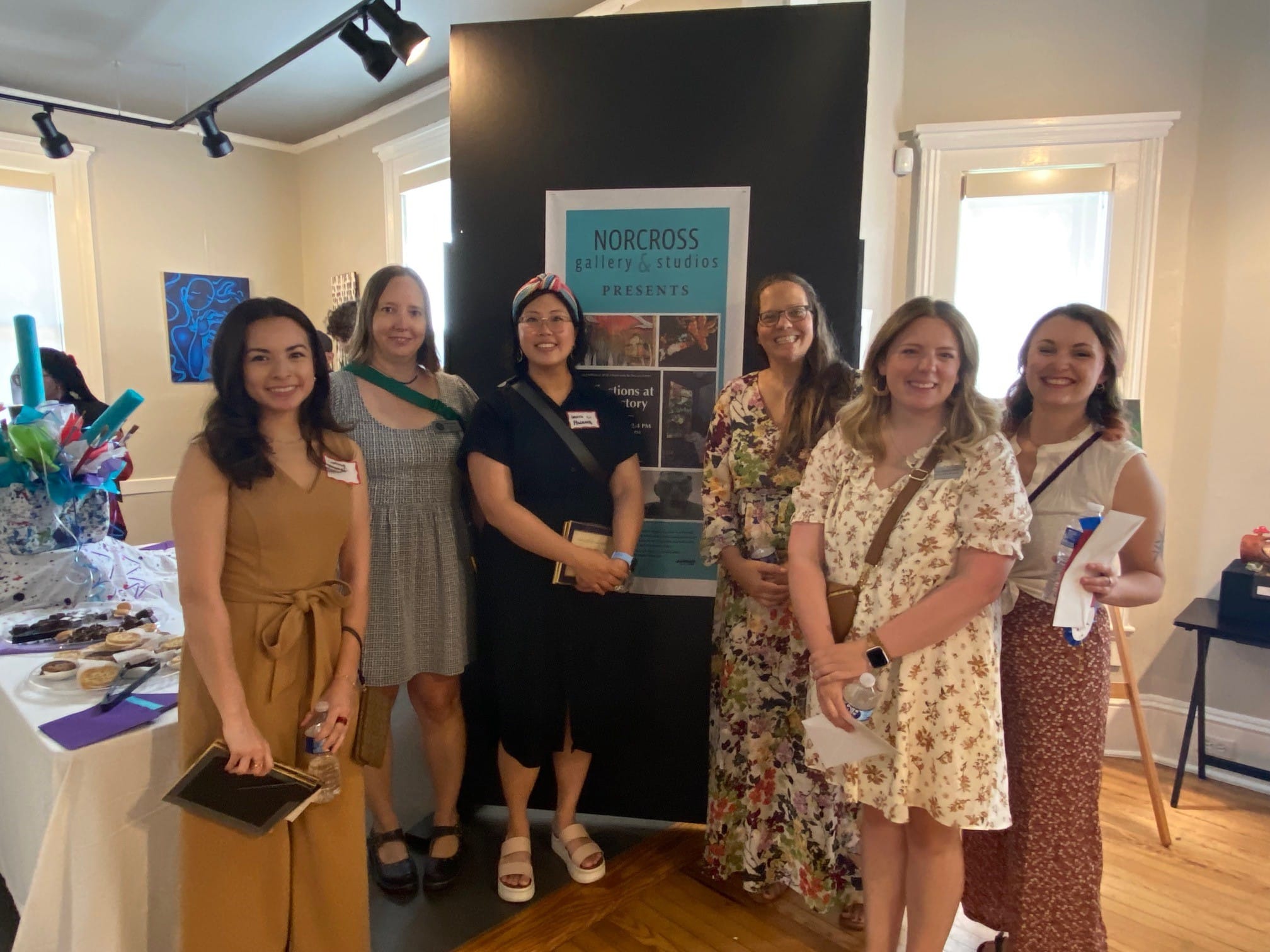
From May 11 through May 18, the Norcross Gallery & Studios kicked off a fantastic exhibition, Reflections at Rectory, which showcased the works of 36 rising stars: AP and IB art students from our local high schools.
The opening reception celebrated their creativity and dedication. Gallery director Anne Hall presented a dozen awards generously sponsored by the community, a testament to the local support for these young artists.
One prestigious award, the Terri Enfield Memorial Award, holds special significance.
Established by Terri’s daughters, it recognizes not just artistic excellence, but also leadership, work ethic and the spirit of collaboration. Last year’s winner, Aidan Ventimiglia, even played a part in selecting this year’s recipient Jasmine Rodriguez.
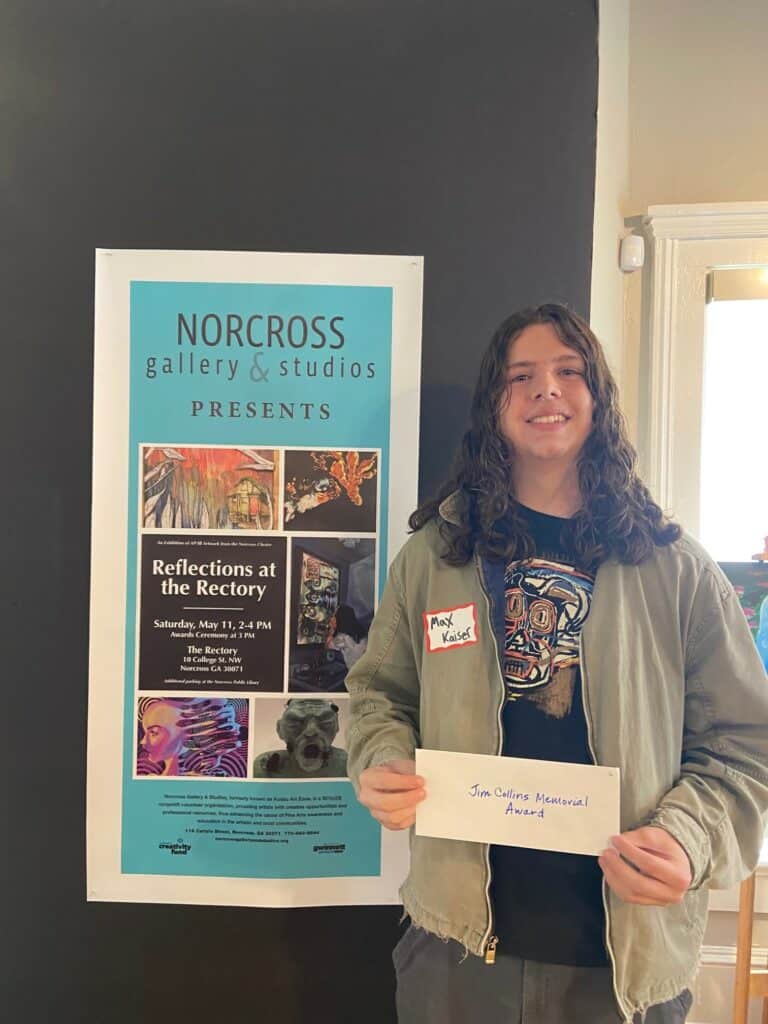
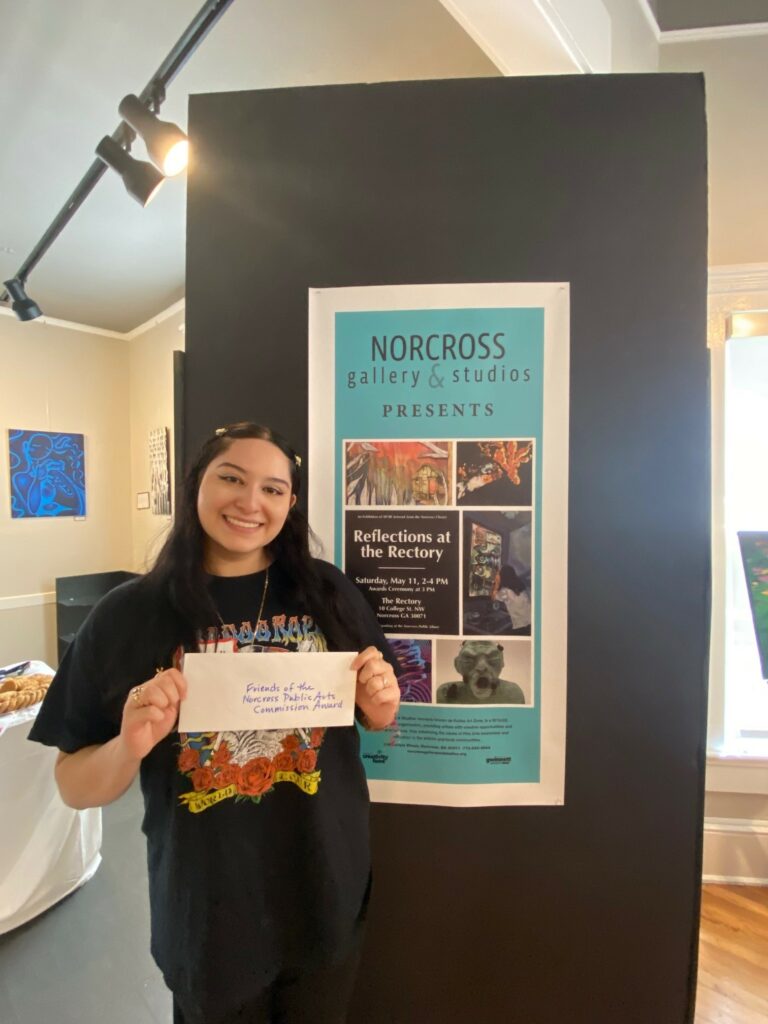
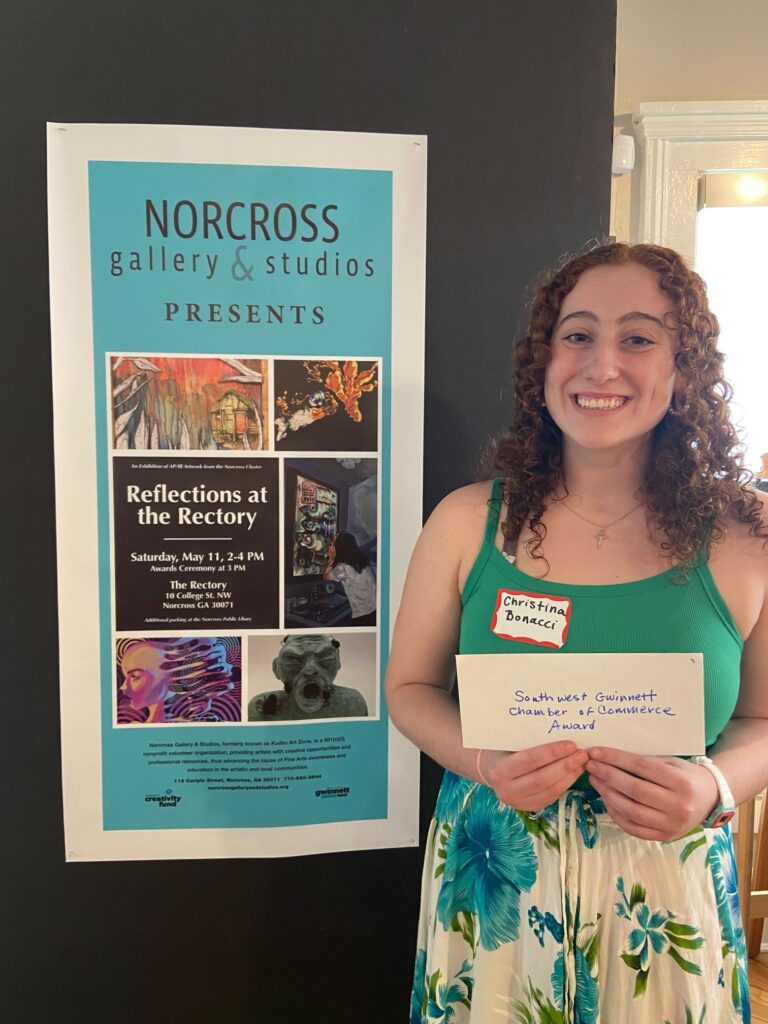
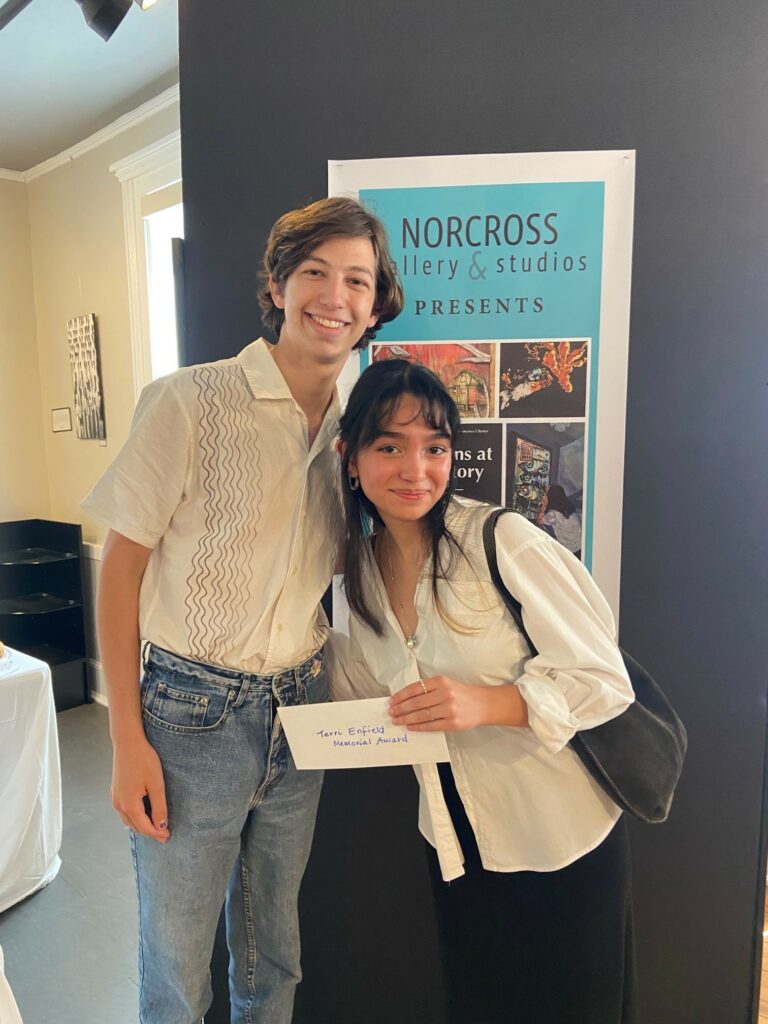
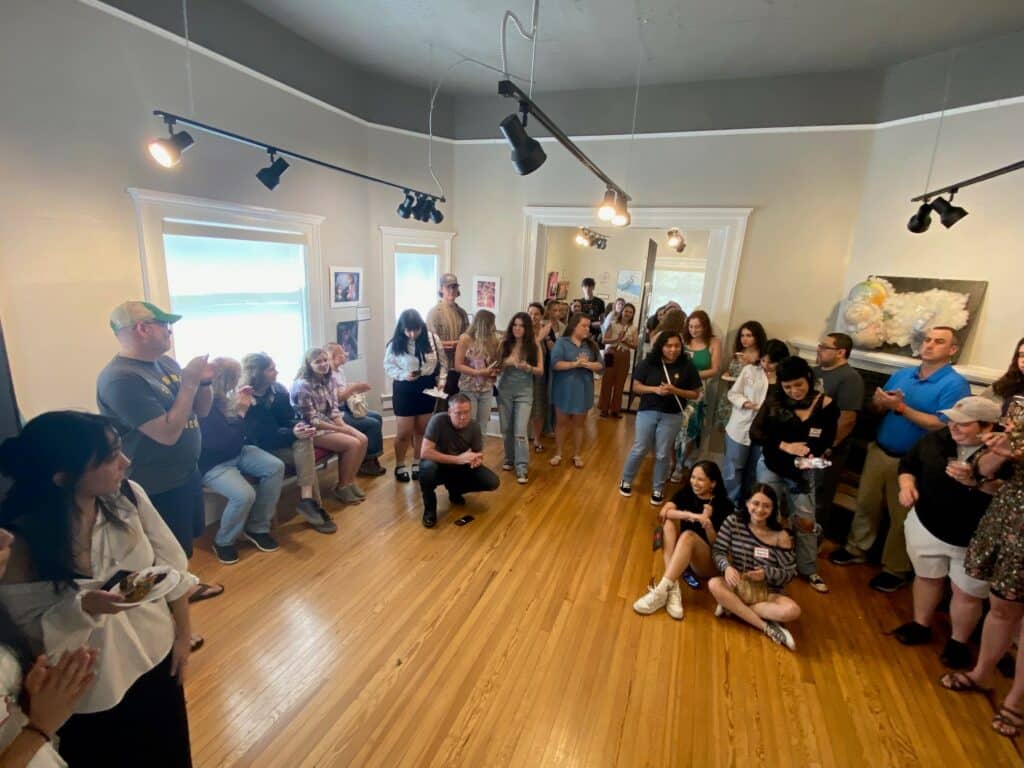
Congratulations to all the student artists.
Students in the second annual Reflections at the Rectory exhibit
Norcross High School:
- Gustavo Benumea-Sanchez
- Maycol Cruz Padilla
- Dorie Liu
- Harlet Martinez Castro
- Paulina Santana
- Gisela Rojas Medina
- Clare Fass
- Ava Netherton
- Ubaldo Diaz
- Katia Navas-Juarez
- Mariah Ingram
- Arisdelcy Juan
- Max Kaiser
- Dani Olaechea
- Christina Bonacci
- Diana Ortiz Ventura
- Katie Yerbabuena-Padierna
Paul Duke High School:
- Adamu Abdul-Latif
- Salma Noor Alabdouni
- Samrin Zaman
- Camryn Vinson
- Liz Damian
- Cecelia Berenguer
- Jasmine Rodriguez
- Angelina Bae
- Dahyana Perez
- Jonah Swerdlow
- Kyra Allicock
- Anni Brown
- Kaleb Fields
- Destiny Jones
- Gabriela Leal-Argueta
- Madisyn Mathis
- Ashley McDonough
- Ahtziri Pinones
- Alondra Valiente-Torres
Related
Arts & Literature
Book, TV and Podcast Recommendations for this Summer
Published
2 months agoon
June 2, 2024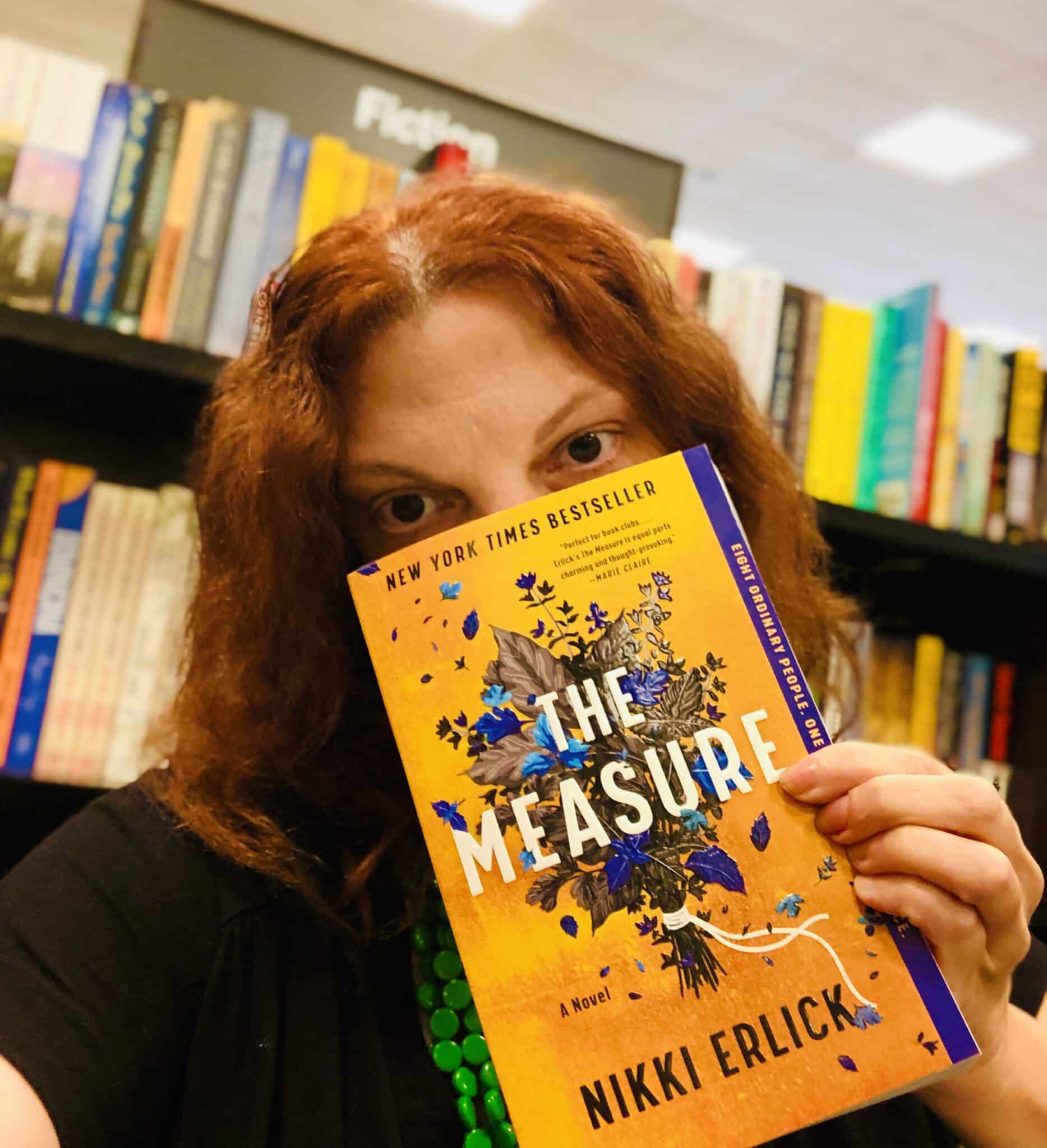
Beat the heat this Summer with a good book, show or podcast. This year, Peachtree Corners Magazine received over 30 recommendations from more than a dozen city residents. There is something for everyone on this list, so let’s dive in.
Machine Made: Tammany Hall and the Creation of Modern American Politics
by Terry Golway
This 400-page book offers readers a comprehensive and insightful exploration of one of the most influential political machines in American history. It provides valuable lessons and perspectives on the intersection of politics, power and society.
Turning Point: The Bomb and the Cold War
Stream on Netflix
This nine-part series offers viewers a thought-provoking exploration of one of the most consequential periods in modern history. It provides deep insights into the complexities of nuclear politics and the enduring legacy of the Cold War.
Fareed Zakaria GPS
Listen on CNN Audio
This podcast comprehensively examines foreign affairs. It enhances a listener’s global awareness, fosters critical thinking and sheds light on complex issues shaping our world today.
— Brian Johnson, City Manager for Peachtree Corners
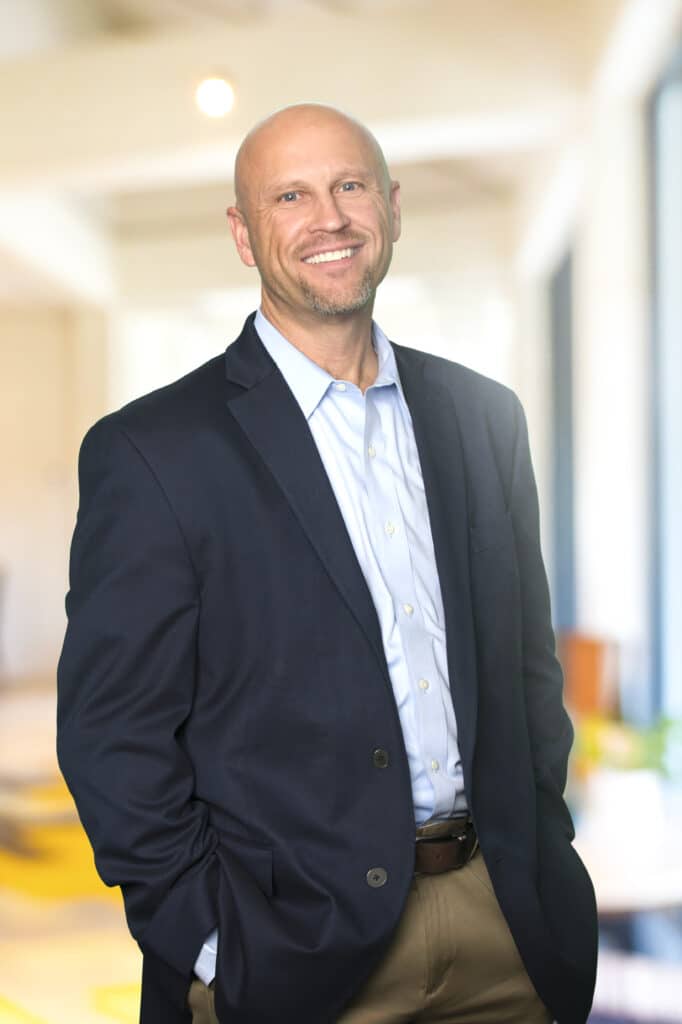
Empowering Nurses Through Self-care: Unleashing Your Potential and Thriving in the Nursing Profession
by Audrey Boyce
Audrey Boyce offers a practical guide to help nurses find balance and fulfillment in their personal lives and professions. With a comprehensive overview of self-care strategies, this book is essential for nurses looking to recharge, reduce stress and increase job satisfaction.
The Go-Giver, Expanded Edition: A Little Story About a Powerful Business Idea by Bob Burg and John David Mann
The Go-Giver tells the story of Joe, an ambitious young man striving for success. Through Joe’s journey, this book imparts powerful lessons about the significance of giving, collaboration and building meaningful relationships in achieving success.
Special Ops: Lioness
Stream on Paramount+
The protagonist, Joe, attempts to balance her personal and professional life as the tip of the CIA’s spear in the war on terror. The Lioness Program enlists Cruz to operate undercover alongside Joe among the power brokers of State terrorism.
Money and Wealth
Listen on Apple Podcasts
In Money and Wealth, John Hope Bryant provides valuable insights into financial literacy and wealth-building strategies. With a clear and accessible approach, Bryant aims to empower listeners with practical knowledge to achieve financial stability and success.
— Bobby Cobb, CEO of Cobb Global Outreach Inc.
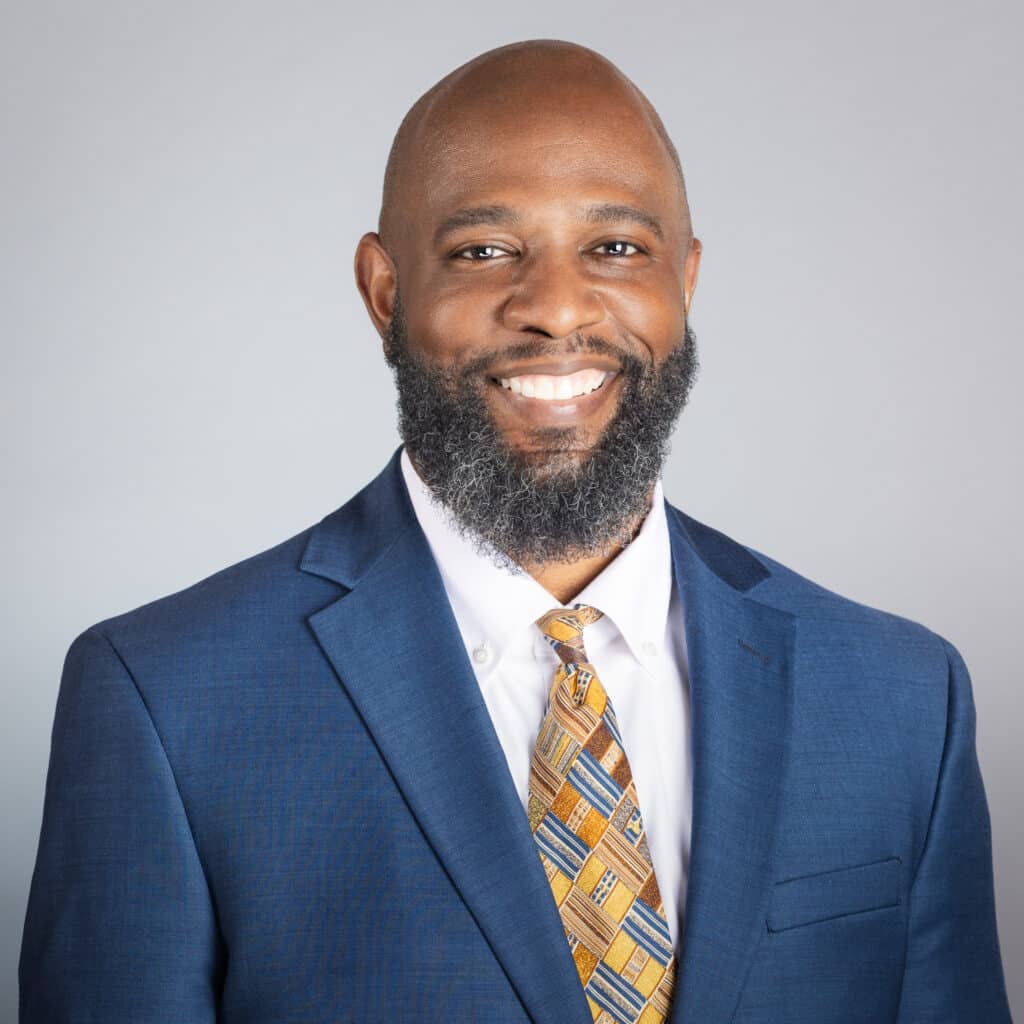
1984
by George Orwell
The new audio drama of George Orwell’s 1984 on Audible is nothing short of phenomenal. With a full cast of film stars and sound effects in stereo, you’ll feel like you’re actually in Oceania, being watched by Big Brother.
— Jill Tew, local author of the forthcoming young adult dystopian novel The Dividing Sky
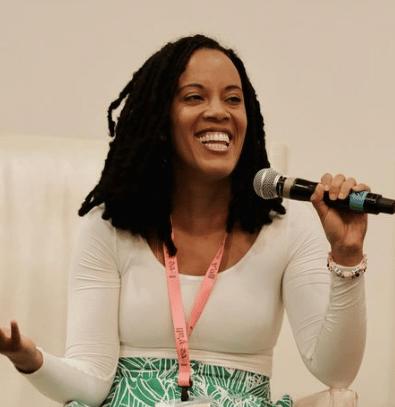
Enter Ghost
by Isabella Hammad
I recently read this and loved the writing. The author plays around with formatting between narrating the story and switching to the format of a play to show the dynamics between characters.
— Ruwa Romman, Georgia State Representative
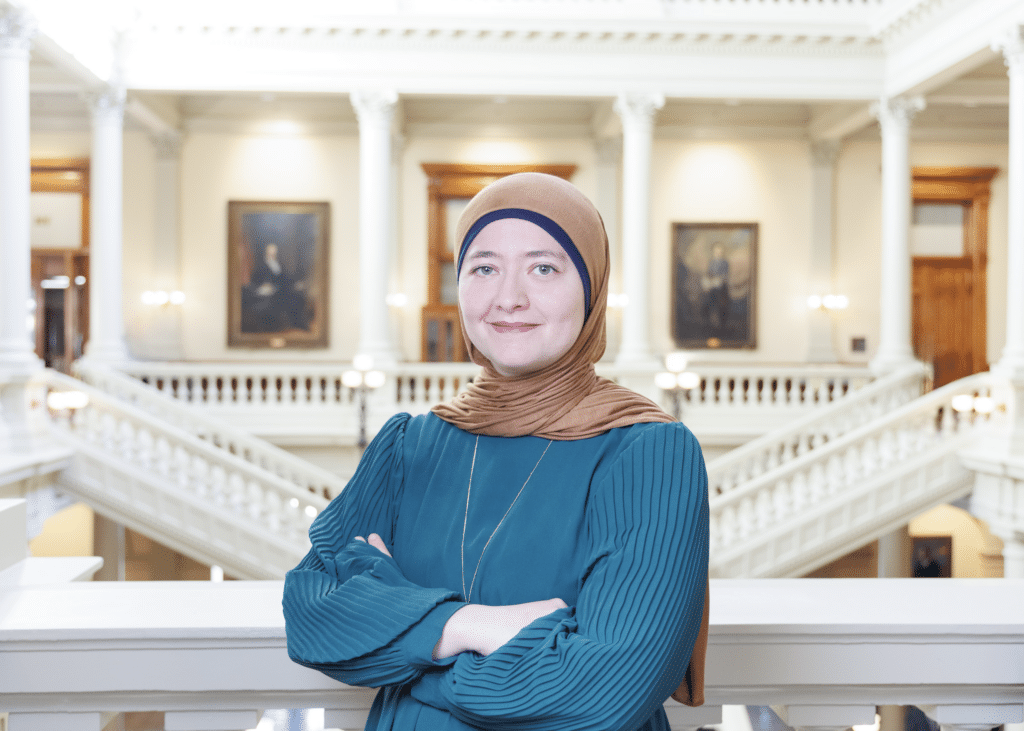
Seeing Eye Girl
by Beverly Armento
Beverly Armento’s account of her life in Seeing Eye Girl is truly remarkable. I was captivated by her story of resilience, strength and, ultimately, forgiveness.
— Erin Griffin, Norcross High School Foundation for Excellence Co-President
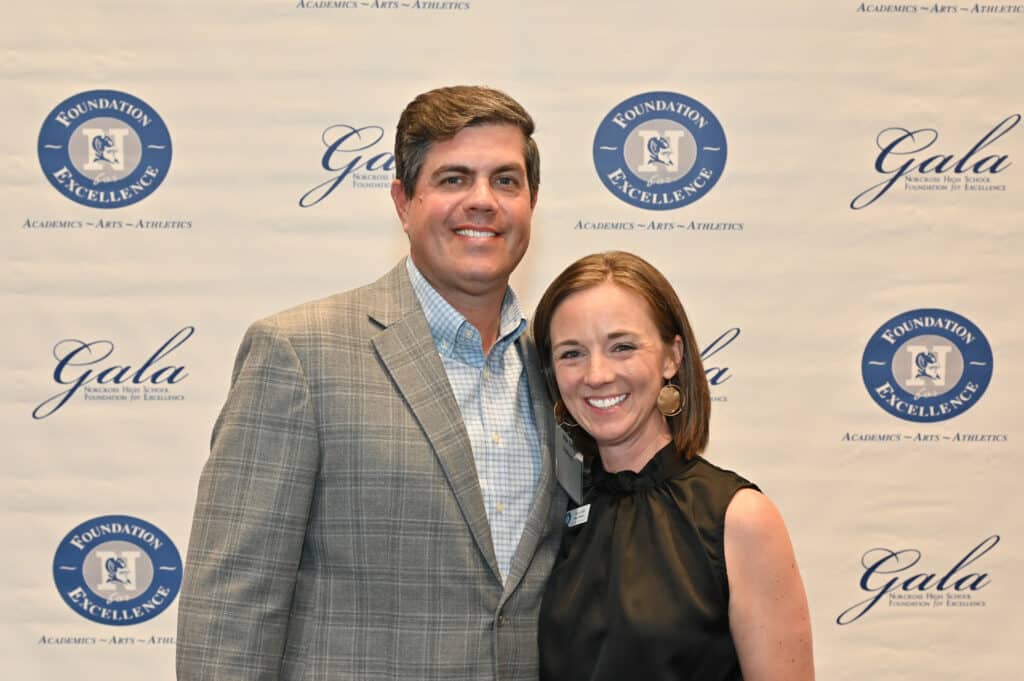
Never Enough: When Achievement Pressure Becomes Toxic – And What We Can Do About It
by Jennifer B. Wallace
This book presents research on how to raise healthy, joyful achievers in a hyper-competitive world. The author was a guest speaker at Greater Atlanta Christian’s (GAC) Parent Partnership Series this year, and we heard about the importance of children knowing that their intrinsic self-worth is not contingent solely upon external achievements.
The Anxious Generation
by Jonathan Haidt
Discover the root causes behind the epidemic of today’s teen mental illness. With compelling data, Jonathan Haidt unveils the decline of play-based childhood and offers practical solutions for a healthier, more fulfilling upbringing. We have asked GAC faculty to add this to their personal summer reading list.
— Dr. Scott Harsh, President of Greater Atlanta Christian School
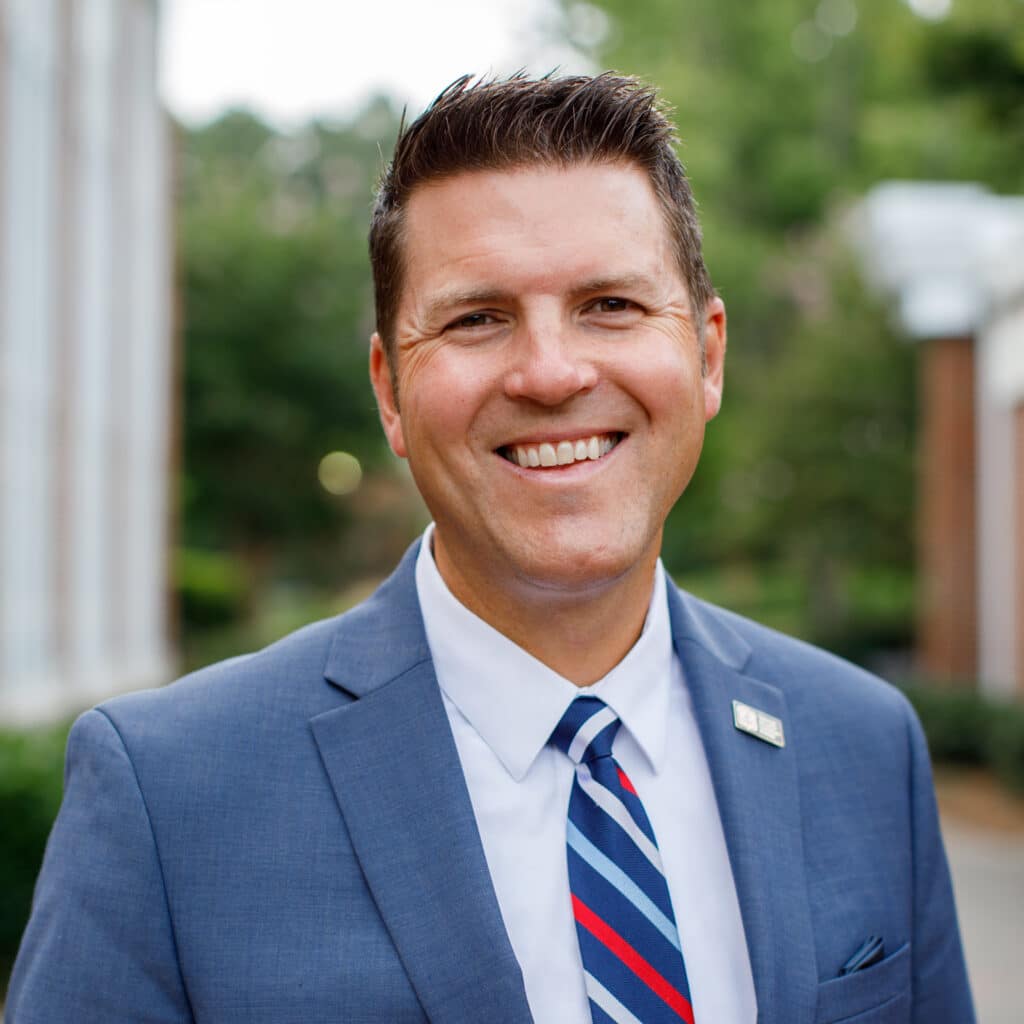
Glad You’re Here
by Craig Cooper and Walker Hayes
Glad You’re Here tells the true, redemptive story of country music singer Walker Hayes and his unlikely friendship with pastor Craig Cooper. In alternating chapters, each individual shares their unique perspective on pivotal moments in their friendship, and the book reminded me to prioritize the patient and persistent cultivation of community.
— Ann Cousins, Communications Director and Wesleyan School
The Boredom Experiment
Listen on Apple Podcasts
The Boredom Experiment, hosted by Jeremy and Ashley Parsons, is a short, heartfelt podcast series that documents and explores the effect of removing digital distractions and social media from their family’s lives for a year.
Over eight episodes, they share their experiences and insights into how this experiment impacts their creativity, relationships and overall well-being. The Parson’s storytelling thoughtfully weaves together interviews, music and their musings in such a creative, personal way that makes it an absolute delight to listen to.
The 1000 Hours Outside Podcast
Listen on Apple Podcasts, Spotify and Youtube
Digital Minimalism
by Cal Newport
Digital Minimalism advocates for a thoughtful and intentional approach to technology use. Newport argues that constant connectivity and digital distractions hinder productivity and well-being and encourages individuals to choose tools and habits that align with their values and long-term goals. In a digitally crowded world, this book was a needed reminder to be intentional with my time and strategic with how I use technology.
— Natalie Dettman, Creative Director at Wesleyan School
Sideline C.E.O.
by Marty Smith
While on this surface this book offers great wisdom from some of the most successful coaches of our time, it also provides a behind-the-scenes look at the lives of many people we admire.
From learning about Greg Sankey figuring out how to lead the SEC through Covid as he sat on his front porch to Mack Brown processing through how to lead his football team through racial tensions at UNC, you realize that these men [and women] are normal human beings that face the same difficult choices as the rest of us.
Not to mention, Marty Smith captures the lives and insight of these coaches in a fun, compelling way!
Practicing the Way
by John Mark Comer
New Kid
by Jerry Craft
Where Do We Go from Here
by Martin Luther King Jr.
— Joseph Antonio, Middle School Principal at Wesleyan School
West with Giraffes
by Linda Rutledge
This is lightly based on a true story. It is the story of moving giraffes who survived a hurricane, were rescued in the Atlantic, and were carried cross-country to the San Diego Zoo. It is well-written, and the character development is fantastic.
Crossing the country with two giraffes during the Depression created excitement in all the small struggling areas. The joy of those who had never dreamed of seeing a giraffe in real life will bring joy to anyone reading this book.
Housewives of True Crime
Listen on Apple Podcasts and Youtube
Moms and Mysteries
Listen on Apple Podcasts, iHeart Radio and Spotify
Southern Fried Crime
Listen on Apple Podcasts and Youtube
Wiser than Me with Julia Louis-Dreyfus
Listen wherever you get your podcasts
— Nancy Minor, The Nancy Minor Team
The Women
by Kristen Hannah.
A great read about the Army nurses in Vietnam.
— Laurie Rogers, The Nancy Minor Team
In The Woods
by Tana French
This book is a real page-turner. The author is a gifted writer, so even though it is a crime thriller, it reads like a novel. There are six books in the series, and I have read all of them.
Casefiles
Listen on Apple Podcasts and Spotify
This is a true crime podcast that has been around for several years. The stories are detailed and very interesting and cases are examined from all over the world.
— Shameka Allen, MBA, MA, CEO of Good Samaritan Health Centers of Gwinnett
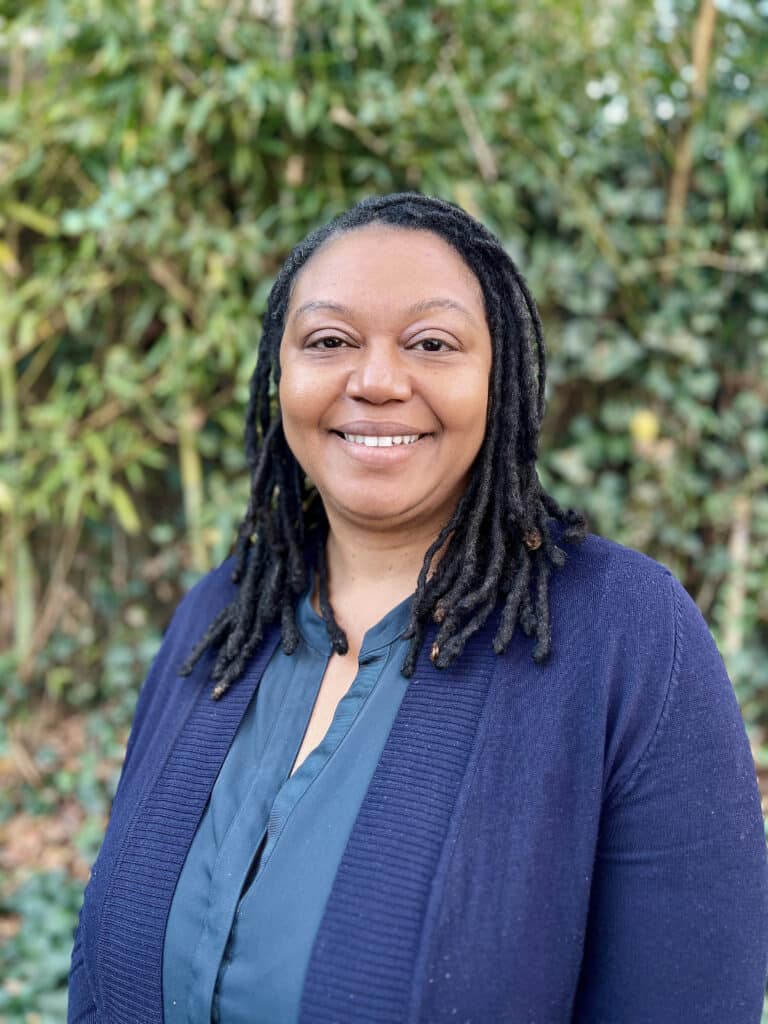
Over the Edge of the World
by Laurence Bergreen
Over the Edge of the World is a captivating account of Magellan’s expedition around the world. We all know Magellan’s name but few of us know the rich details behind the adventure and how it unfolded. I was inspired by the courage and bravery of those who took part in the great Age of Exploration.
Arrested Development
Stream on Netflix
This is easily one of our favorite shows. My wife, Meredith, and I have watched and re-watched it so many times and still find it so hilariously funny. The show blends clever writing with quirky characters and intricate, running gags. There’s always money in the Banana Stand!
Dr. Death
Listen on Apple Podcasts, Spotify and Wondery
This gripping true-crime podcast explores the shocking story of a dangerous surgeon. It’s a must-listen for its compelling narrative, deep investigative journalism and critical insights into medical malpractice and systemic failures. The podcast has since been made into a limited streaming TV series.
— Scott Hilton, Georgia State Representative
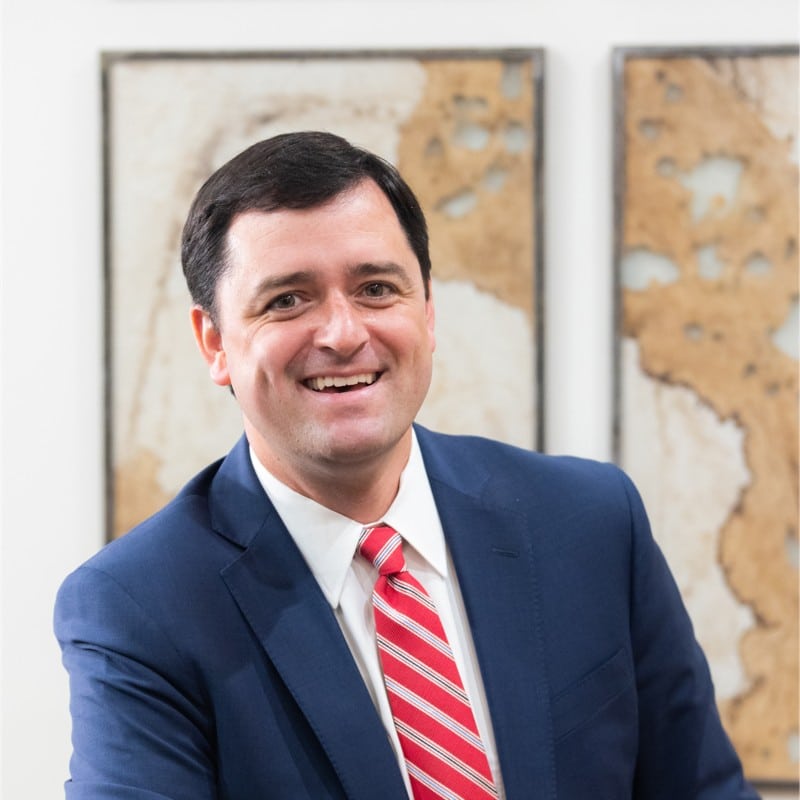
Sleep Wrecked Kids
by Sharon Moore
This book explains how inadequate sleep affects children’s growth, development and learning. This is a great guide to creating better sleep routines.
Healthy Sleep Happy Kid
by Meghna Dassani
This quick, easy read offers valuable insights into how sleep impacts a child’s health. It provides practical tips for improving your child’s sleep environment and habits and is a go-to resource for parents aiming to enhance their child’s sleep and overall wellness.
I can’t overstate the importance of good sleep habits for the overall well-being of your child and the entire household. Quality sleep is the foundation for happy, healthy kids and stress-free parents, setting the stage for the best possible summer with your family.
— Dr. Gia Grannum, Board Certified Pediatric Dentist of Agape Pediatric Dentistry
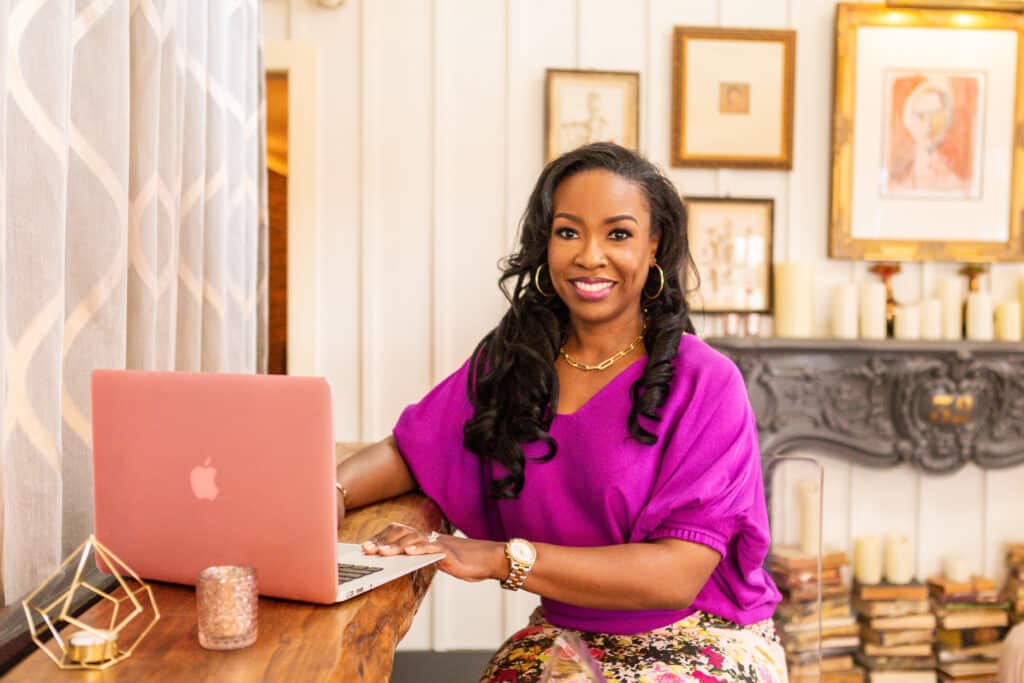
The Measure
by Nikki Erlick
I recommend The Measure by Nikki Erlick, which is about to come out in paperback! It’s a great pick for summer reading or a book club!
Poured Over, the Barnes & Noble Podcast
Stream on the Barnes & Noble website and Apple Podcasts
Check out the Poured Over podcast for interviews with your favorite authors, book recommendations for your TBR pile and more.
— Amanda Couch, Assistant Manager at Barnes & Noble at The Forum
Want even more recommendations? Check out last year’s list here.
Related
Read the Digital Edition
Subscribe
Keep Up With Peachtree Corners News
Join our mailing list to receive the latest news and updates from our team.
You have Successfully Subscribed!

Taste of Peachtree Corners: PCBA Showcases Local Restaurants

What’s going on at Jones Bridge Park and the Challenges of Urban Development

The Forum Gives Sneak Peek of New Eateries and Community Spaces

Southwest Gwinnett Mayors Share Visions for the Future

Peachtree Corners Shines Bright with Light Up the Corners Glow Race this August

8 Events Happening In and Around Peachtree Corners This August

Peachtree Corners Shines Bright with Light Up the Corners Glow Race this August

The Forum Gives Sneak Peek of New Eateries and Community Spaces

8 Events Happening In and Around Peachtree Corners This August

Southwest Gwinnett Mayors Share Visions for the Future

Taste of Peachtree Corners: PCBA Showcases Local Restaurants

What’s going on at Jones Bridge Park and the Challenges of Urban Development

Local Resident Opens AtWork Location in Peachtree Corners

CHRIS 180 Expands its Services into Gwinnett County [Podcast]

Light up the Corners [Video]

Capitalist Sage: Business Leadership in Your Community [Podcast]

Cliff Bramble: A Culinary Adventure through Italy

Top 10 Brunch Places in Gwinnett County

A Hunger for Hospitality

THE CORNERS EPISODE 3 – BLAXICAN PART 1

Top 10 Indoor Things To Do This Winter

The ED Hour: What it takes to Remove Barriers from Education
Peachtree Corners Life
Topics and Categories
Trending
-
Business1 week ago
Taste of Peachtree Corners: PCBA Showcases Local Restaurants
-
Business2 days ago
The Forum Gives Sneak Peek of New Eateries and Community Spaces
-
City Government4 days ago
Southwest Gwinnett Mayors Share Visions for the Future
-
Community2 days ago
Peachtree Corners Shines Bright with Light Up the Corners Glow Race this August






